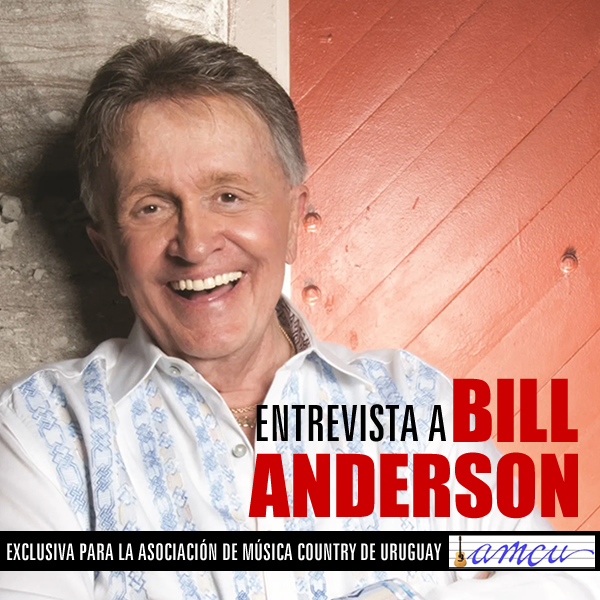
Entrevista a un gigante del Country
 |
Tenemos el orgullo
de traerles una segunda entrevista y nuevamente, una realizada a un ícono
del género country: Bill Anderson, uno de los mayores compositores del
género country, cuyos clásicos han sido grabados por más
de 400 cantantes distintos.
La entrevista fue concedida en exclusiva para la Asociación de Música
Country de Uruguay y pasa a engalanar nuestra sección de Entrevistas.
¡Esperemos que la disfruten!!
Breves
datos biográficos
Entrevista a Bill Anderson (traducción)
Links
Entrevista a Bill Anderson (entrevista en inglés)
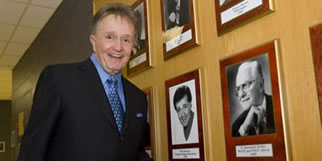 Apodado
"Whispering Bill", Anderson nació en Columbia, Carolina del
sur, el 1º de noviembre de 1937. Estudió periodismo en la Universidad
de Georgia, trabajando como disc-jockey al mismo tiempo y comenzó a trabajar
como periodista deportivo, pero dejó para iniciar una carrera en la música
en 1958 cuando Ray Price tuvo éxito con "City Lights",
compuesta por Anderson. Muchas otras de sus canciones comenzaron a ser
grabadas por otros artistas: Hank Locklin, Jim Reeves, Porter Wagoner, Faron
Young, Jean Shepard, Connie Smith, Jerry Lee Lewis, entre muchos otros. Su éxito
como cantante llegó en 1962 con "Mama Sang a Song",
seguida por "Still" y "8 x 10" y logró
llegar al Nº 1 en los rankings country en 7 oportunidades. Anderson grabó
con la cantante Jan Howard y descubrió a Mary Lou Turner, con quien tuvo
exitosos dúos como "Sometimes" y "I Can't
Sleep With You" en la década de los 70. En los años
60 y 70 también tuvo sus propios shows televisivos y ganó muchísimos
premios como compositor, continuando este éxito cuando canciones suyas
empezaron a ser grabadas por artistas de las nuevas generaciones como Steve
Wariner, Rick Trevino, George Strait, Kenny Chesney, Mark Wills, Vince Gill,
Lorrie Morgan, Tracy Byrd, John Michael Montgomery, Brad Paisley y muchos más.
Apodado
"Whispering Bill", Anderson nació en Columbia, Carolina del
sur, el 1º de noviembre de 1937. Estudió periodismo en la Universidad
de Georgia, trabajando como disc-jockey al mismo tiempo y comenzó a trabajar
como periodista deportivo, pero dejó para iniciar una carrera en la música
en 1958 cuando Ray Price tuvo éxito con "City Lights",
compuesta por Anderson. Muchas otras de sus canciones comenzaron a ser
grabadas por otros artistas: Hank Locklin, Jim Reeves, Porter Wagoner, Faron
Young, Jean Shepard, Connie Smith, Jerry Lee Lewis, entre muchos otros. Su éxito
como cantante llegó en 1962 con "Mama Sang a Song",
seguida por "Still" y "8 x 10" y logró
llegar al Nº 1 en los rankings country en 7 oportunidades. Anderson grabó
con la cantante Jan Howard y descubrió a Mary Lou Turner, con quien tuvo
exitosos dúos como "Sometimes" y "I Can't
Sleep With You" en la década de los 70. En los años
60 y 70 también tuvo sus propios shows televisivos y ganó muchísimos
premios como compositor, continuando este éxito cuando canciones suyas
empezaron a ser grabadas por artistas de las nuevas generaciones como Steve
Wariner, Rick Trevino, George Strait, Kenny Chesney, Mark Wills, Vince Gill,
Lorrie Morgan, Tracy Byrd, John Michael Montgomery, Brad Paisley y muchos más.
Su autobiografía,“Whisperin’
Bill,” fue publicada en 1989 y cuenta fascinantes anécdotas
sobre su vida y carrera en el mundo del espectáculo. El libro fue escrito
en tres años y se convirtió en un best seller. Su segundo libro,
fue un humorístico vistazo al mundo musical, titulado “I Hope
You’re Living As High On The Hog As The Pig You Turned Out To Be,”
publicado en 1993 y ahora en su cuarta edición.
Dentro de los muchísimos premios y reconocimientos en el mundo del entretenimiento,
recibió en el año 2001 el mayor galardón al ser incluido
en el Salón de la Fama de la Música Country (Country Music Hall
of Fame).
Entrevista
a Bill Anderson: un ícono norteamericano.
AMCU - ¿Cómo se le ocurrió el apodo “Whispering
Bill”? (Susurrador Bill)
Bill Anderson - A mí no se me ocurrió. Me lo puso en broma Don Bowman, un comediante en mi show televisivo.
AMCU - Usted ha escrito muchos clásicos country pero cuál de ellos lo enorgullece más?
Bill Anderson - Esa es una pregunta difícil, pero quizás tenga que decir "City Lights" (Luces de la Ciudad" porque fue mi primer éxito y lanzó mi carrera como compositor.
AMCU - Sus canciones han sido interpretadas por un gran número de artistas. ¿Qué versión de una de sus canciones interpretada por otro es su favorita?
| |
Bill Anderson - Esa es otra difícil pregunta para responder porque ha habido tantas de las que estoy orgulloso. De pronto podría decir que la versión de "Still" que hizo el cantante de soul James Brown, porque tomó lo que escribí como una canción country y lo extendió al terreno del rhythm and blues. A mí jamás se me hubiera imaginado así como lo hizo hasta que lo hizo así. Él era un verdadero artista.
AMCU - ¿Piensa usted que un cantante que escribe sus propio material "entiende" mejor la canción y tiene cierta ventaja sobre el artista que interpreta las canciones de otro?
Bill Anderson - La mayoría de las veces, sí. El cantante sabe lo que él, como compositor, sintió cuando la canción estaba siendo compuesta. De ahí que la misma emoción y sentimiento están aptos para surgir cuando la canta.
AMCU - Los años 60 y 70 vió el surgimiento de innumerables artistas que podían escribir sus propias canciones como Tom T. Hall, Kris Kristofferson, Merle Haggard, Dolly Parton, Willie Nelson, Johnny Cash, Roger Miller, usted mismo y muchos otros, que convirtieron esas canciones en clásicos. ¿Cuál de los cantantes-compositores de hoy día cree usted que sigue esa tradición?
Bill Anderson - Ahora mismo diría que el mejor es un joven llamado Jamey Johnson. El cielo es el límite para él y su talento.
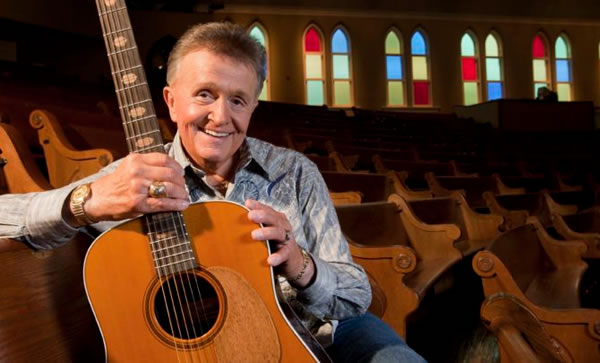 |
AMCU - ¿Qué canción clásico escrita por otro compositor le hubiera gustado componer a usted?
Bill Anderson - Probablemente “The Song Remembers When” de Hugh Prestwood. Esa canción me llega emocionalmente cada vez que la oigo.
AMCU - ¿Cuáles artistas eran sus favoritos en sus épocas de disc-jockey?
Bill Anderson - Hank Williams, Sr., ha sido siempre mi favorito absoluto. Otros de esos días incluían a George Jones, Johnny Cash, Faron Young, Hank Snow y Hank Thompson. Pero mientras fueran country, me gustaban todos.
AMCU - ¿Cuál de los artistas de hoy en día usted programaría regularmente si estuviera trabajando como disc-jockey hoy?
Bill Anderson - Jamey Johnson, Craig Morgan, Josh Turner, Brad Paisley, LeAnn Womack, Patty Loveless, Vince Gill y George Strait estarían al tope de la lista.
AMCU - 1962 y 1963 lo vieron a usted al tope de las listas por 7 semanas en dos ocasiones con “Mama Sang a Song” y “Still”. Usted tenía sólo 25 años de edad: pensaba en ese momento que había alcanzado la cúspide o podía ver que venían más éxitos?
Bill Anderson - En ese momento, no pensaba en términos de longevidad. Yo sólo me divertía y me pellizcaba cada mañana para asegurarme que todas buenas cosas me estaban realmente sucediendo. No fue hasta años más tarde que comencé a ver todo en términos de carrera.
AMCU - Usted ha logrado casi todo lo que uno puede lograr en el terreno de la música country, incluyendo haber sido electo al Salón de la Fama de la Música Country (Country Music Hall of Fame). ¿Piensa que hay algo que aún se deba a usted mismo?
Bill Anderson - Hay un par de libros dentro de mí que me gustaría escribir. Ahora mismo, sin embargo, simplemente no tengo el tiempo. Quizás algún día.
AMCU - ¿Sabía usted que el Dia Internacional de la Música -17 de septiembre, cumpleaños de Hank Williams- fue originalmente una idea pensada en España? ¿Está usted al tanto de la popularidad de la Música Country fuera de los Estados Unidos?
Bill Anderson - No, no lo sabía. He estado de gira fuera de los Estados Unidos en unas cuantas ocasiones y siempre me alegra saber que estoy en un país extranjero y que nuestras canciones y discos son conocidos allí. Sé que los públicos para los que he cantado en Escandinavia, en el Reino Unido, en Alemania, en Holanda y en Canada son de los más receptivos públicos de cualquier lado.
AMCU - Una de sus canciones, “Walk out Backwards” fue grabada en español por Rick Trevino, y se titula “Salte de Espaldas”. ¿Ha tenido oportunidad de escucharla?
Bill Anderson - Sí, la grabó en Español y poco tiempo después la grabó en Inglés y recibí una copia cuando recién lo hizo. No puedo entender la letra, pero seguro que me gusta!
AMCU - Aparte de Jan Howard y Mary Lou Turner, ¿con qué otras artistas femeninas ha disfrutado grabando?
Bill Anderson - No ha habido muchas más. Dolly Parton cantó conmigo en mi más recie nte album, “Whispering Bluegrass.” He grabado con Rustie Blue, Elizabeth Cook, una joven británica llamada Toni Bellin, y una cantante de bluegrass llamada Michelle Nixon. En este momento, no puedo pensar en otras, pero he disfrutado de grabar con todas ellas.
AMCU - El vicepresidente de nuestra asociación, el Sr. Julio Cavallaro, tuvo la oportunidad de visitar su restaurante Po’ Folks, y estuvo impresionado no sólo por la música, sino por la calidez y la decoración del lugar. ¿Aún tiene ese restaurante?
Bill Anderson - No, ya no estoy conectados con ellos. Yo fue su representante desde 1981 a 1994 he hice la mayoría de sus comerciales para radio y televisión. En un momento, había casi 200 restaurantes a lo largo de Estados Unidos, pero sólo un puñado de ellos quedan abiertos hoy.
AMCU -¿Hay algo más que quisiera usted agregar o comentar?
Bill Anderson - No, pero les agradezco por la oportunidad de tener esta visita. Espero que algún podamos vener esta conversación en persona. Les deseo lo mejor.
AMCU -
¡Muchas gracias!
Preguntas por Raul Tejeiro para la Asociacion de Musica Country de Uruguay.
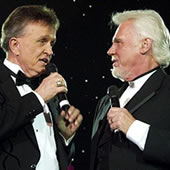 |
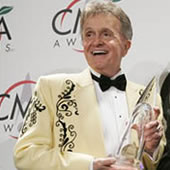 |
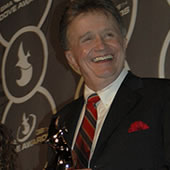 |
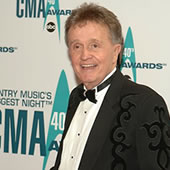 |
Links
BillAnderson.com
Country
Music Hall of Fame and Museum
Amazon
(cds)
YouTube
videos
Interview
with Bill Anderson, an American icon.
AMCU - How did you come up with the nickname “Whispering Bill”
Bill Anderson - I didn’t come up with it. It was given to me in fun by Don Bowman, a comedian on my television show.
AMCU - You have written many country classics but which one of them makes you feel the proudest?
Bill Anderson - That’s a tough question, but I would probably have to say “City Lights” because it was my first hit and launched my career as a songwriter.
AMCU - Your songs have been covered by a large number of artists. Which version of one of your songs covered by another artist is your favourite?
Bill Anderson - That’s another very difficult question to answer because there have been so many that I’m proud of. Off the top of my head I would say perhaps soul-singer James Brown’s version of “Still,” because he took what I wrote as a country song and expanded it into the field of rhythm and blues. I would have never pictured it that way until he did it. He was a true “artist.”
AMCU - Do you think that a singer who writes his own material “understands” the song better and is at an advantage over the artist who performs somebody else’s songs?
Bill Anderson - Most of the time, yes. The singer knows what he, as the writer, felt when the song was being composed. Therefore, that same emotion and feeling is more apt to come out when he sings it.
AMCU - The 60s and 70s saw the emergence of countless artists who could write their own songs like Tom T. Hall, Kris Kristofferson, Merle Haggard, Dolly Parton, Willie Nelson, Johnny Cash, Roger Miller, yourself and many others, who turned those songs into classics. Which of today’s singer-composers do you feel carry on that tradition?
Bill Anderson - Right now I’d say the best is a young man named Jamey Johnson. The sky is the limit for him and his talent.
AMCU -Which classic song written by another composer do you wish you had written?
Bill Anderson - Probably “The Song Remembers When” by Hugh Prestwood. That song touches me emotionally every time I hear it.
AMCU - Which artists were your favourite ones in your DJ days?
Bill Anderson - Hank Williams, Sr., has always been my absolute favourite. Others from those early days included George Jones, Johnny Cash, Faron Young, Hank Snow, and Hank Thompson. But as long as they were country, I liked them all.
AMCU - Which of today’s country stars would you regularly play if you were working as a DJ today?
Bill Anderson - Jamey Johnson, Craig Morgan, Josh Turner, Brad Paisley, LeAnn Womack, Patty Loveless, Vince Gill, and George Strait would be at the top of the list.
AMCU - 1962 & 1963 saw you topping the charts for 7 weeks on both occasions with “Mama Sang a Song” and “Still”. You were only 25 years old: did you think at the time that you had reached your summit or could you see that there was more success to come?
Bill Anderson - At the time, I really didn’t think in terms of longevity. I was just having fun and pinching myself every morning to make sure all those good things were really happening. It wasn’t until years later that I began to see it in terms of a career.
AMCU - You have accomplished just about anything that one could in the country music field, including being elected to the Country Music Hall of Fame. Do you feel there is still something that you owe to yourself?
Bill Anderson - There are a couple more books inside me that I would like to write. Right now, though, I simply do not have the time. Maybe someday.
AMCU - Do you know that the International Country Music Day –September 17th, Hank Williams’ birthday- was originally an idea coming from Spain? Are you aware of the popularity of Country Music outside the U.S.?
Bill Anderson - No, I did not know that. I have toured outside the U.S. on quite a few occasions, and I’m always thrilled to be in a foreign country and know that our songs and our records are known there. I know the audiences I have played for in Scandanavia, in the U.K., in Germany, Holland, and in Canada are among the most responsive audiences anywhere.
AMCU - One of your songs, “Walk out Backwards” was recorded in Spanish by Rick Trevino, and it is titled “Salte de Espaldas”. Have you had the chance to listen to it?
Bill Anderson - Yes, he recorded in Spanish shortly after he recorded it in English, and I received a copy of it when it first came out. I can’t understand the lyrics, but I sure like it!
AMCU - Apart from Jan Howard and Mary Lou Turner, which other female artists have you enjoyed recording with?
Bill Anderson - There haven’t been that many others. Dolly Parton sang with me on my most recent album, “Whispering Bluegrass.” I’ve recorded with Rustie Blue, Elizabeth Cook, a British girl named Toni Bellin, and a female bluegrass singer named Michelle Nixon. Right now, I can’t think of any others, but I enjoyed recording with them all.
AMCU - The vicepresident of our association, Mr. Julio Cavallaro, had the chance to visit your Po’ Folks restaurant, and he was not only impressed by the music, but also by the warmth and decoration of the place. Do you still have that restaurant?
Bill Anderson - No, I am no longer connected with them. I was their corporate spokesman from 1981 to 1994 and did most of their radio and television commercials. At one time there were nearly 200 restaurants across the U.S., but only a handful of them remain open today.
AMCU -Is there anything that you would like to add/comment?
Bill Anderson
- No, but I thank you for the opportunity to have this visit. Hopefully someday
we can have a conversation in person. All best wishes.
AMCU - Thank you very much!!
Questions by Raul Tejeiro for the Country Music Association of Uruguay